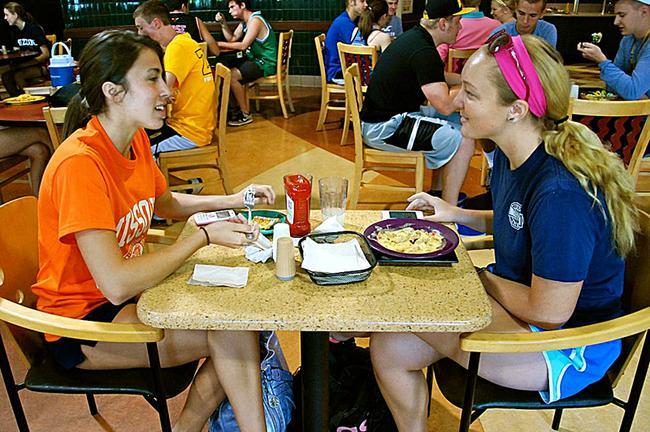
After a trial run during Summer Welcome sessions, Campus Dining Services officially decided all dining halls will become trayless for the 2011-12 school year.
The decision was made after the positive response of the trial at Summer Welcome this year. Missouri Students Association President Eric Woods and Residence Halls Association President Chris Rucker asked incoming freshmen their opinions on trayless dining during meals at Rollins dining hall. They received positive feedback and support from the Summer Welcome attendees.
“Eric Woods and I visited Summer Welcome sessions during meal times and asked the freshmen their opinions on trayless dining,” Rucker said. “The success was unbelievable.”
Woods said the transition to trayless dining was more accepted than previous attempts because of the time period the trial was given.
“Previous times the trial was given mid-semester,” Woods said. “It’s not a good test time because you give them one thing and then take it away.”
Even though all the dining halls are trayless, different halls offer different services based on the building. Plaza 900 and Mark Twain Market still use trays for students to put their waste on after they are finished eating.
“Those buildings are made to accommodate trays,” Woods said. “CDS doesn’t have money to change that at the moment, however, there will still be a marked decrease in food waste.”
Woods said the university is looking into purchasing belts that wouldn’t require trays, but they cost upwards of $50,000 each.
Students are encouraged to fit as much trash on the trays as possible to continue to reduce the use of soap and water needed to clean the trays.
Dobbs offers students disposable plates and cups in place of the trays and reusable plates other dining halls offer because the hall was built without a dish room.
Trayless dining falls under the school’s sustainability program, which works to make the school more eco-friendly. With this change 65 tons of food and drink are no longer being wasted on campus and 100,000 gallons of water a year are being conserved, as well, according to the CDS website.
“I think it’s fabulous,” freshman Emily Topczewski said. “You pay more attention to what you eat. I just get up once and get as much as I can carry, and then I’m done because I never want to wait in those lines for more food.”
Not only is the trayless dining option more environmentally friendly, but it is also saving CDS money, which in turn can benefit the students.
“Instead of pocketing the savings, CDS wants to know how students want to improve dining services,” Woods said.
Rucker said resources could be redistributed by expanding the use of locally grown foods, a larger variety of foods and more fresh fruits and vegetables, but are not limited to these options.
Former MSA President Jordan Paul, who also tried to enact trayless dining during his tenure, was pleased about the new hall options.
“It’s good,” he said. “It finally happened. It’s never been an earth-shattering thing, but it’ll cut down on how much we waste and hopefully allow CDS to do things they haven’t been able to before, such as expanding meal options.”